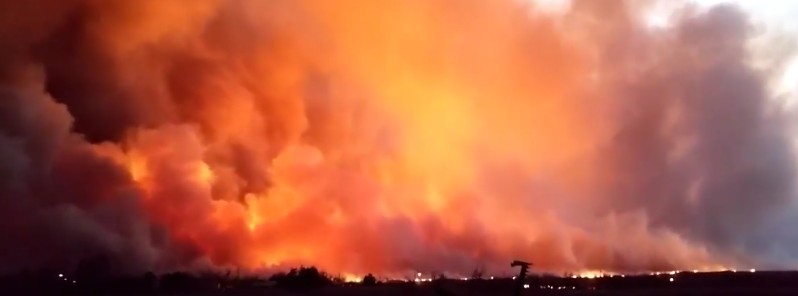Large and deadly wildfires strike Texas, Kansas, Oklahoma and Colorado

At least four people have died in Texas Panhandle where wildfires scorched more than 130 000 hectares (320 000 acres) and prompted mandatory evacuations. Large grass fires are also affecting Colorado, Kansas and Oklahoma, some of which are also forcing evacuations. Red Flag Warnings are in effect throughout much of Kansas and Oklahoma as well as portions of Colorado, Nebraska, South Dakota, Iowa, Illinois and Missouri.
NWS said this spate of fires is due to the elevated fire-weather conditions resulting from the combination of strong winds, low-humidity, and abundant fuels.
According to Reuters, a woman and two men died on Monday in a fire in Gray County, Texas. One was overcome by smoke and died in an area hospital and the other two died from burns, said County Judge Richard Peet. "They were trying to move cattle away from the oncoming fire," he said in a telephone interview.
A fourth person was killed in nearby Hemphill County but the circumstances were not immediately available, said Phillip Truitt, incident commander with the Texas A&M Forest Service, which monitors wildfires. He said one of the blazes had neared the Pantex Plant nuclear weapons facility but posed no threat.

Currently, the largest fire in Texas is the so-called Perryton blaze that spread rapidly on Tuesday to cover nearly 121 000 hectares (300 000 acres). The fire is 50 percent contained and has so far has destroyed at least two houses.
In Oklahoma, wildfires in the northwest part of the state burned more than 4 000 hectares (10 000 acres) and led to evacuations of multiple towns.
In central Kansas, more than 10 000 residents were asked to evacuate their homes due to a wildfire in Reno County, where about 230 responders were on the scene, the county's emergency management agency said, as reported by Reuters. Evacuations have been ordered in Ashland and Englewood and the Clark State Lake areas in Clark County, Kansas.
Red Flag Warnings are in effect throughout much of Kansas and Oklahoma as well as portions of Colorado, Nebraska, South Dakota, Iowa, Illinois and Missouri because of dry conditions and winds that will fuel fires, the NWS said and added that the atmosphere over western Kansas remains extremely dry on March 7.
The National Weather Service (NWS) in Dodge City, Kansas issued a Fire Message at 02:21 CST on Tuesday, March 7, 2017 and noted that critical fire weather conditions expected again today.
The NWS Fire Message says "Winds are expected to increase again with daytime heating. Strongest winds are expected along I-70 with weaker but still significant winds farther to the south near the Oklahoma border. The winds and low relative humidity will create critical fire weather conditions again this afternoon and may exacerbate ongoing firefighting operations. Winds will diminish again by late afternoon."
In Logan County, Colorado, a wind-driven wildfire erupted on the eastern plains of the state on Monday, scorching 12 000 hectares (30 000 acres) of grassland. The fire forced the temporary evacuation of a small farming town and destroyed at least three homes, emergency officials said.
On Tuesday, Logan County officials declared a local emergency thus turning the incident to the State of Colora for the purpose of assistance and funding.
The blaze was 50 percent contained, the Logan County Office of Emergency Management said in a statement Tuesday. No injuries have been reported.
It was one of several fires that burned across the eastern half of Colorado Monday.




Featured image: Wildfire burning in Texas – March 2017. Courtesy: Jennifer Robertson / Storyful

Commenting rules and guidelines
We value the thoughts and opinions of our readers and welcome healthy discussions on our website. In order to maintain a respectful and positive community, we ask that all commenters follow these rules:
We reserve the right to remove any comments that violate these rules. By commenting on our website, you agree to abide by these guidelines. Thank you for helping to create a positive and welcoming environment for all.